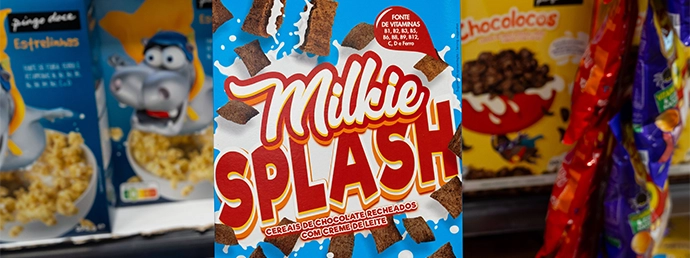Our nutritional reformulation strategy prioritises foods that:
- are mostly consumed by children;
- contain high levels of salt, sugar, fat, saturated fat and/or unnecessary additives;
- are highly consumed and, as such, their reformulating might have a material positive impact on public health;
- although they might be perceived as being healthy by the consumers, their nutritional profile needs to be adjusted;
- are low in fibre, vitamins and minerals;
- have ingredients that could potentially cause allergic reactions.
In 2024, the recipes of 58 food products were reformulated (including perishables). These reformulations prevented the use of 576 tonnes of sugar, 169 tonnes of fats (45 tonnes of fat and 125 tonnes of saturated fat) and 60 tonnes of salt.
We also added fibre content to six products (one in Poland and five in Portugal), to over 13 tonnes.
Nutritional reformulations1 |
|
Biedronka |
|
Pingo Doce |
|
Recheio |
|
Ara |
|
Total |
||||||||
|---|---|---|---|---|---|---|---|---|---|---|---|---|---|---|---|---|---|---|
Number of reformulated products2 |
|
24 |
|
13 |
|
3 |
|
18 |
|
58 |
||||||||
Salt (references) |
|
15 |
|
0 |
|
0 |
|
14 |
|
29 |
||||||||
Sugar (references) |
|
7 |
|
7 |
|
3 |
|
8 |
|
25 |
||||||||
Fat (references) |
|
5 |
|
6 |
|
0 |
|
0 |
|
11 |
||||||||
Saturated fat (references) |
|
1 |
|
6 |
|
0 |
|
7 |
|
14 |
||||||||
Quantities avoided (tonnes)3 |
|
|
|
|
|
|
|
|
|
|
||||||||
Salt |
|
46.9 |
|
0 |
|
0 |
|
13.2 |
|
60.1 |
||||||||
Sugar |
|
453.8 |
|
25.0 |
|
3.7 |
|
93.1 |
|
575.6 |
||||||||
Fat |
|
32.5 |
|
12.1 |
|
0 |
|
0 |
|
44.6 |
||||||||
Saturated fat |
|
24.5 |
|
8.0 |
|
0 |
|
92.1 |
|
124.6 |
||||||||
|
||||||||||||||||||
Poland
The focus on reducing salt was directed towards ready-made meals, namely the lasagna Danie Express, and Salato and Go Vege salads and vegetables slices, respectively. In these cases, Biedronka prevented the use of more than 25 tonnes of salt. The sugar content of two references of Madero ketchup was reduced on average by 25% (almost 371 tonnes of sugar avoided) and the saturated fat from the mini cookies from the Bonitki brand, mostly consumed by children, was reduced by more than 80% (almost 25 tonnes of saturated fat avoided).
Biedronka’s commitment to “clean” labelling has been reinforced by the ongoing removal of superfluous thickeners, such as guar, xanthan and locust bean gum (from the carob tree), smoke flavour, and sweeteners, namely aspartame and acesulfame K.
Portugal
Pingo Doce has replaced ordinary sea salt with iodised salt in all its soups. The Portuguese Directorate-General for Health has advised that the use of iodised salt is a preventive measure against iodine deficiency, especially in vulnerable groups such as pregnant women and children up to two years of age.
The recipes for Pingo Doce and Amanhecer breakfast cereals and Pingo Doce yoghurts, products mainly consumed by children, have been reviewed and the sugar content has been reduced by between 12% and 49% (almost 25 tonnes of sugar avoided). Fat and saturated fat have been removed from 12 Pingo Doce yoghurts (more than 20 tonnes of fats avoided).
The sorbate potassium preservative has been removed from Masterchef light fresh cheese and all animal ingredients have been removed from Amanhecer cooking cream margarine ensuring it is now a plant-based product.
Progress on the commitments made by Pingo Doce under the Portuguese government’s Integrated Strategy for the Promotion of Healthy Eating (EIPAS) can be found on our corporate website.
Wholegrains as breakfast cereals’ main ingredient
Our Portuguese Companies have reached the target of having 100% of breakfast cereals containing wholegrains as their main ingredient two years ahead of our own deadline. In Poland, Biedronka’s progress reached 92% of the eligible products (44 references out of 48, which includes products that, in practice, contain whole grain as the main ingredient but are not labelled as such in the ingredient list).
This has been an outcome of the straight cooperation process of with our suppliers to review recipes, specifically to use wholegrains (wheat, oats, barley, rye and rice) as the first ingredient. Corn-based cereals were excluded of this process.
The option for these products has nutritional benefits for consumers. Wholegrain cereals can contain more nutrients than refined ones, including more fibre.

Colombia
Six BEM products have been reformulated to cut artificial colourings and the Sonelo margarine had a 33% decrease of hydrogenated fats (almost 62 tonnes of fat avoided). Regarding children’s products, Ara has revised the recipes for its Bubu fruit jams. These products are made with 100% fruit, have no added sugar and are preservatives and colorants-free (15 tonnes of sugar avoided). In Ara’s Private Brand cosmetics, several components that could potentially harm consumers have been removed from six products.
